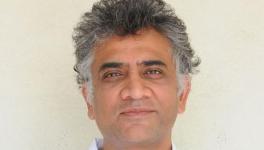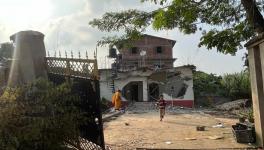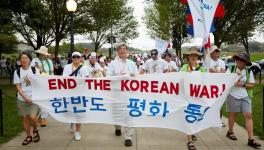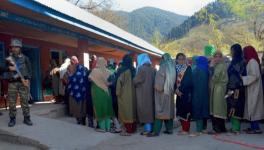Jesús Santrich in Critical Condition After Release and Re-arrest
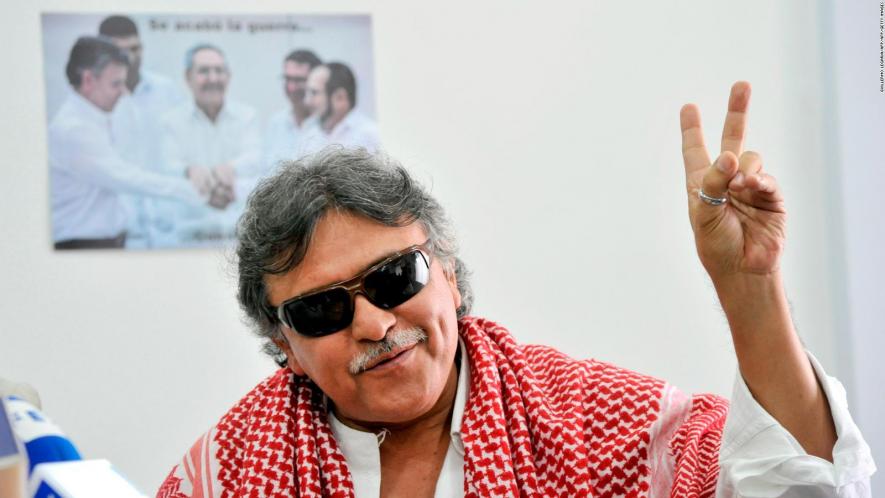
Jesús Santrich was released and re-arrested this past Friday May 17, 2019 in Bogotá.
The peace process in Colombia has reached a new low point. The release and immediate rearrest of political prisoner Jesús Santrich is a clear sign that the Colombian government has sacrificed its duty to defend its people in order to follow the diktats of US imperialism. Santrich was a prominent leader of the now-demobilized Revolutionary Armed Forces of Colombia (FARC), He was also part of the peace negotiation team for the group and now is a member of the legal political party Common Alternative Revolutionary Force (FARC).
Jesús Santrich has been in captivity for thirteen months since his arrest on April 9, 2018. He is accused of trafficking cocaine to the US, despite there being no evidence against him. A US court had demanded his extradition.
On May 15, the Special Peace Jurisdiction (JEP)* released a ruling barring the extradition of Jesús Santrich and demanding that he be released immediately. They also stated that his case would be dealt with by the JEP itself and not through the ordinary justice system. Their reasoning was that the attorney general and the US court that ordered for his arrest had not provided sufficient evidence to show that his supposed crime had been committed after the signing of the peace agreements (which would have excluded him from being processed through the JEP).
Around 11 am on May 17, Friday, reports surfaced that Santrich had been gravely injured at the La Picota Prison in the south of Bogotá where he has been held for the last year, and needed immediate medical attention. It has since been confirmed that Santrich was suffering from self-inflicted wounds due to rumors that the National Government was conspiring on how to achieve his extradition. Shortly after, the Superior Court of Bogotá ruled in favor on granting Santrich Habeas Corpus and ordered he be freed immediately, this ruling has more weight than that of the JEP as it came from the ordinary justice system.
After the news about Santrich’s health surfaced, social and political activists, human rights defenders, and defenders of peace gathered outside La Picota Prison to demand the immediate release of the unjustly detained political prisoner. There, they were witnesses to the grave human rights violations that Jesús Santrich was subjected to.
At around 4pm Santrich’s lawyers were speaking to him and arranging his exit with the guards. At 4:40pm, agents of the National Penitentiary and Prison Institute -INPEC- rolled out an unconscious and weakened Santrich from the prison. Within minutes, the limp Santrich was descended upon by agents of the Technical Investigation Unit of Attorney General’s Office who proceeded to read a fresh arrest warrant, while his supporters who chanted demanding he be released, were held back by the Public Force.
Though the charges being pressed remained unclear, the nearly unconscious Santrich was wheeled back to prison and minutes later a police helicopter landed and with the accompaniment of the Mobile Anti-Disturbance Squadron (ESMAD) and Police agents. Santrich was put on the helicopter and brought to the bunker of the Attorney General’s Office.
Benedicto de Jesús González, a member of Congress from the FARC political party, told the Colombian magazine Semana that they were informed that his release took longer than expected because the doctors in the prison were giving him a glucose-rehydration IV. He highlights that at 4pm Santrich was lucid and conversing with his lawyers and at 4:40 pm he was unconscious and as such, González suspects that in this glucose IV he was also given a psychopharmacological drug which sedated him in order to put him on the helicopter. He denounced that Santrich’s re-arrest was carefully planned, and that they knew it was important to have him physically and mentally weak in order to recapture him without resistance.
At 7pm on the same day, Santrich’s lawyers were allowed finally allowed to see him in the Bunker, and they found him unconscious on a small mattress on the floor with a team of paramedics attending to him. At 10:30pm a team of doctors were allowed to enter and attend to him and requested that he be immediately brought to a hospital due to the critical state he was in. Finally at around 3am, Santrich was transferred to the Intensive Care Unit of the Méderi Hospital in Bogotá where doctors evaluated that he was suffering from a cardiac arrest.
González mentioned that the sharp aggravation of his condition could be due to the fact that Santrich suffers from epilepsy and Leber’s hereditary optic neuropathy, for which he takes several medications which could have interacted negatively with the psychopharmacological drug illegally used to sedate him.
Santrich remains in the Méderi Hospital where sources say his condition has stabilized but many across Colombia worry that his incarceration and extradition are eminent. Colombian authorities have also alleged that they want to carry-out the hearing to formalize the charges against him (which Colombian law stipulates must be carried out in the first 36 hours after his arrest) in the Intensive Care Unit where he is being cared for, despite different doctors and medical teams declaring that he is not in any conditions to participate in a legal hearing.
The FARC political party called the days events a “grotesque spectacle, wherein the most fundamental human rights of Jesús Santrich were violated, affecting his physical and emotional health, as well as his human dignity; at the same time there was a shameless violation of basic principles of legal order…like the respect to effective freedom and due process.”
They denounced that the “illegal detention of Jesús Santrich, conceived by the Attorney General, is an attempt to ignore the Special Jurisdiction for Peace, and as it attempts to ridicule the Political Constitution and its rulings, it also seeks to weaken the fundamental pillar of the Peace Agreement.”
Santrich’s release and illegal recapture was met with anger and sadness by Colombian activists and human rights defenders and activists from across the world. The Colombian state, a state which has never worked in favor of its people and has historically been subservient to US interests, has reached a new extreme with this episode. Defenders of peace and justice must rally their support around Jesús Santrich and denounce the criminal actions committed by the government of Iván Duque.
*The Special Peace Jurisdiction (JEP) is a transitional justice system established through the Havana peace agreements to investigate, judge and sentence all those considered responsible for the crimes committed during a five-decade war between the guerrilla forces and the Colombian security forces.
Get the latest reports & analysis with people's perspective on Protests, movements & deep analytical videos, discussions of the current affairs in your Telegram app. Subscribe to NewsClick's Telegram channel & get Real-Time updates on stories, as they get published on our website.












